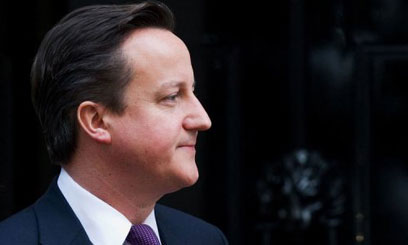LONDON, Dec 13 – British Prime Minister David Cameron told lawmakers that his decision to veto a new EU treaty was in the national interest, while insisting that membership of the bloc remained vital.
Deputy Prime Minister Nick Clegg of the pro-Europe Liberal Democrats was notably absent from Cameron’s side in parliament, underscoring the rift the issue has caused in the Conservative-led coalition government.
Cameron said he had sought a deal at a eurozone crisis summit last week that would be acceptable to all 27 EU nations but they refused his “modest, reasonable and relevant” demands for safeguards for the City of London.
“I went to Brussels with one objective, to protect Britain’s national interests, and that is what I did,” Cameron said, to cheers from his Conservative party.
He said Britain would continue to work with the other 26 EU nations, which after his veto went on to agree in principle to join a “new fiscal compact” aimed at saving the debt-hit euro.
“Britain remains a full member of the EU, and the events of last week do nothing to change that. Our membership of the EU is vital to our national interest,” he said.
He also took a softer line than British officials had over the weekend about whether Britain would allow the other EU nations to use the bloc’s institutions to pursue their pact without the United Kingdom.
But Cameron faced fierce criticism from opposition Labour leader Ed Miliband, who accused him of coming back with a “bad deal for Britain” that had no safeguards for the vital City of London financial hub.
“Far from protecting our interests he has left us without a voice,” he said.
Cameron’s position has also angered the Liberal Democrats, the junior partners in the coalition formed in May 2010 with a mandate to cut Britain’s deficit.
Clegg’s office said he did not turn up because he did not want to be a “distraction”. On Sunday Clegg had criticised the deal and said it could turn Britain into an international “pygmy”.
“When I was told the outcome of the summit, after it finished, I immediately told the prime minister that I could not welcome it,” said Clegg on Monday.
But Cameron’s stance has delighted so-called “eurosceptics” in his party, who in October launched the biggest rebellion of his premiership when they called for a parliamentary vote for a referendum on Britain’s ties to the EU.
John Redwood, an arch-eurosceptic Conservative lawmaker, told parliament: “Britain today has much more negotiating strength because they (the Europeans) know they’re dealing with a prime minister who will say no if he needs to.”
Cameron said Monday that the issue of a referendum “doesn’t arise” because there would be no change in the EU treaties.
French President Nicolas Sarkozy offered a conciliatory message, saying the EU was now a two-speed alliance but that Britain would not be forced out of the bloc’s single market.
“We need Great Britain,” Sarkozy said in an interview with the French newspaper Le Monde.
He said that he and German Chancellor Angela Merkel did “everything” they could to get the British to join the agreement, adding: “But there are now clearly two Europes.”
Cameron insisted Monday that his relationship with Sarkozy remained strong.
“Despite reports to the contrary I’m still on extremely good terms with my friend Nicolas Sarkozy,” he told lawmakers.
Merkel’s spokesman said Britain remained an “important partner” despite its “regrettable” veto.
British Foreign Secretary William Hague on Monday played down London’s veto.
Speaking at a press conference with US Secretary of State Hillary Clinton, Hague insisted the veto of a “new fiscal compact” aimed at saving the euro did not change Britain’s relationship with the European Union.
In a poll for The Times published on Monday, 57 percent of voters supported his decision on Europe, and only 12 percent believed the veto would not safeguard the City of London. The Populus poll sampled 1,951 people.




































